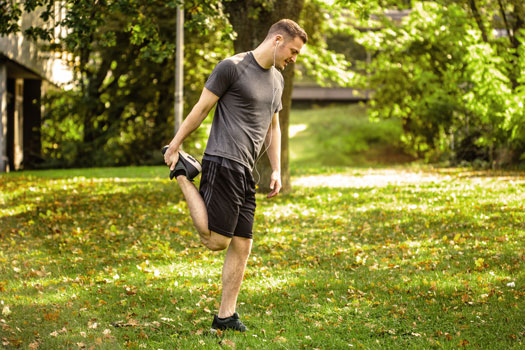
If you have a herniated disc, also commonly known as a "slipped disc" or “ruptured disc,” you could experience distracting pain, numbness, and general weakness extending to nearby areas. While symptoms associated with a herniated disc are different for everyone, there are some things you may be able to do to quickly heal a damaged disc or reach a point where nerve pressure is eased. We go over several ways this goal may be accomplished below.
Hot & Cold Therapy
Herniated disc symptoms are sometimes worsened by insufficient circulation and tissue swelling. Heat applied to the affected area with a heating pad or warming gel can get blood flowing, which speeds up the body's natural healing processes. Cold applications in the form of cooling gel or ice packs ease inflammation within the affected area. Soaking in a warm bath may be beneficial as well.
Moderate or Light Exercise
If you remain inactive beyond an initial period of rest, your symptoms could become more noticeable as spine-supporting muscles weaken. Exercise also plays a role in pain relief by boosting the production of natural feel-good hormones called endorphins. Fortunately, there are many forms of moderate or light exercise that can be beneficial, some of which include:
• Walking at a comfortable pace
• Swimming or other activities done in water
• Doing yoga or Pilates with slow, controlled movements
• Using an elliptical machine
The McKenzie Method
Developed by physical therapist Robin McKenzie, the McKenzie Method is an approach to exercise done in stages in a way that progressively eases pain. The primary goal of this method is to teach patients how to manage their own discomfort. It involves positions that include:
• Extending your legs while lying down to gently stretch your spine
• Stretching as you stand in a way that increases flexibility around your spine
• Bending as you sit to gently stretch your back-supporting muscles
Posture Improvements
Discomfort from a herniated disc in your lower back area can be affected by the way you sit and how you position your body. You may notice meaningful relief if you make an effort to sit in a neutral way and regularly shift your position. Also, avoid slouching and leaning excessively forward so you're not overstressing muscles around the damaged disc.
Better Sleep Habits
You may experience welcome relief from a herniated disc if you adjust your sleep habits. Start by choosing a supportive mattress. With sleep positions, shift to one that retains your spine's natural alignment. Your discs rehydrate as you sleep, so getting sufficient sleep also helps by giving your body more time to naturally heal and recover.
Therapeutic Massages
A relaxing massage may provide you with relief from herniated disc symptoms. In some cases, certain manual manipulations could shift the damaged disc in a way that restores your ability to move without discomfort.
Nonsurgical Decompression
One other way you may be able to quickly heal a herniated disc is with nonsurgical decompression. This is done by using a specially designed traction table that gently eases the disc into a less painful position.
If conservative methods such as those listed above don’t relieve the pain from a herniated disc, treatment recommendations may include surgery to relieve pressure on the irritated or compressed nerve. The most common type of surgery for herniated discs is a discectomy, during which a surgeon goes through the muscles and bone in the back of the spine to reach the damaged disc.
Even though discectomy surgery is a common and generally quite successful procedure, a hole is left in the outer wall of the disc. Patients with a large hole in the outer ring of the disc are responsible for 70 percent of all reherniations after surgery. Fortunately, there’s a new treatment specifically designed to close the large holes that are often left in spinal discs after discectomy surgery. Barricaid is a bone-anchored device proven to reduce reherniations, and it’s been shown to be 95 percent effective in a large study. This means 95 percent of patients weren’t reoperated for a recurrence of their herniated disc in the 2-year study timeframe.
If you have any questions about the Barricaid treatment or how to get access to Barricaid, ask your doctor or contact us at 844-288-7474.
For full benefit/risk information, please visit: https://www.barricaid.com/instructions.


Comments